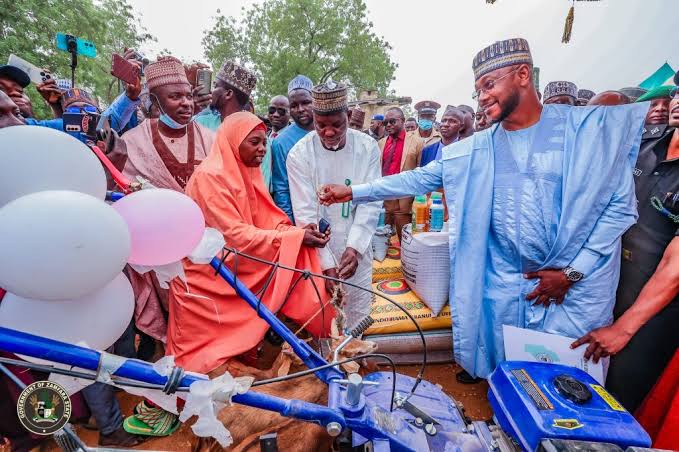By; Zagazola Makama
Zamfara state is rich in arable lands, pasture, water bodies and mineral deposits. The prolific abundance of agriculture and mineral deposits provide opportunities for the inhabitants to practice crop and livestock production as well as mining in commercial quantities.
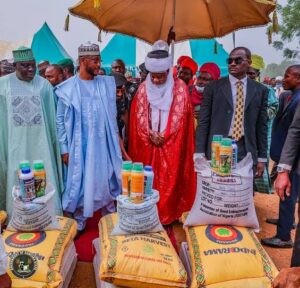
Agriculture and gold mining are the state’s main occupations providing foodstuffs, raw materials and employment opportunities for the people, with over 80 per cent of the population engaged in agriculture, hence the slogan “farming is our pride”.
Major crops such as millet, guinea corn, maize, rice, groundnut, cotton, tobacco and beans, while minerals include iron ore, gold, chromate, granite, clay, limestone, chamovita, quartz and kaolin.
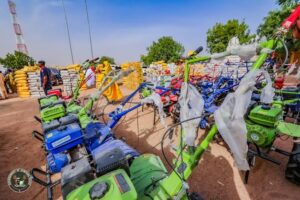 However, the state is one of the poorest in Nigeria and has one of the highest incidences of extreme poverty (over 60% of the population), according to the 2018 World Bank data.
However, the state is one of the poorest in Nigeria and has one of the highest incidences of extreme poverty (over 60% of the population), according to the 2018 World Bank data.
Agriculture and mining attracted thousands of people to the state seeking for alternative means of livelihoods and greener pasture. The trend led to spontaneous population growth within the last years, thus exhausting the scarce state resources, and caused environment and security threats as well as developmental concerns.
The state’s population rose to about 10 million according to a 2021 data by the National Population Commission (NPC). This led to increased demand and competition over scarce lands already affected by the impact of the climate change. This led to loss of livelihoods, poverty, and conflict between farmers and herders.
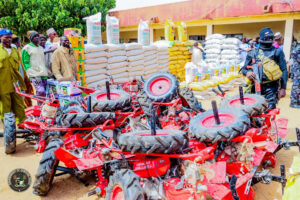
In the last one decade, Zamfara like its neighbours in the North-West region has been engulfed by banditry, kidnapping and other crimes which threatened the social fabric and economy of the state. Many people lost their lives and thousands displaced while large scale destruction of public and private properties were being perpetrated by the bandits resulting to serious humanitarian crisis.
Upon his inauguration on May 29, 2023, Dauda Lawal inherited Zamfara in a state of bankruptcy characterised by decayed institutions, wide spread poverty and hunger among the citizens, thus eroding the confidence of the people in the ability of the government to navigate the security and economic challenges bedevilling the state.
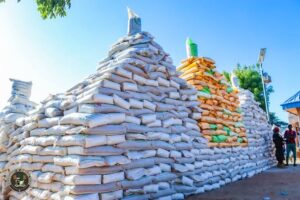
To break the shackles of poverty and address myriad of problems bedevilling the state, the Dauda Lawal’s administration initiated viable empowerment, social and economic infrastructure development programmes, to build a secure, peaceful and prosperous state.
Despite inheriting an empty treasury, Governor Dauda Lawal has accomplished major strides in key sectors to rescue and rebuild Zamfara under his Six Smarts Agenda.
Importantly, agriculture is critical to the administration’s policy programme aim at ensuring economic diversification, poverty reduction, enhance wealth creation and boost state revenue base towards achieving sustainable social and economic development of the state.
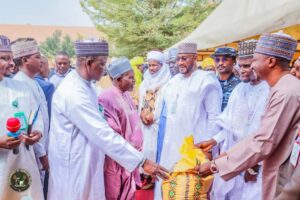
To fully achieve the economic diversification, the Lawal’s administration implemented proactive security measures in concert with the security agencies to protect lives and property, so as to enable farmers to cultivate their farmlands and encourage growth of businesses in the state.
To this end, Lawal demonstrated high commitment to curb the lingering banditry and kidnapping through the establishment of the Zamfara Community Protection Guards (CPG), the pioneer security guard corps in the North-West region.
Members of the guard corps underwent rigorous physical training to prepare them to assist security agencies with credible intelligence to combat insecurity. It has been very helpful in foiling bandit attacks in villages and towns across local government areas of the state. This has given farmers and other people hope for safety and security.
Other interventions by the governor included provision of logistics and equipment to the security agencies such as fueling of patrol armored vehicles, repair of patrol vehicles to improve the security presence throughout the state, as well as conduct of periodic meenting of the State Security Committee meeting.
Also, the Lawal administration through collaborative operations with the security agencies successfully neutralised key bandit kingpins including Kachalla Ali Kawaje, the mastermind of the abduction of students of the Federal University Gusau.
Others are: Kachalla Jafaru; Kachalla Barume, Kachalla Shehu, Tsoho, Kachalla Yellow Mai Buhu, Yellow Sirajo, and Kachalla Dan Muhammadu, Kachalla Makasko, Sanda, Abdulbasiru Ibrahim, Mai Wagumbe, Kachalla Begu, Kwalfa, Ma’aikaci, Yellow Hassan, Umaru Na Bugala, Isyaka Gwarnon Daji, Iliya Babban Kashi, Auta Dan Mai Jan Ido, and Yahaya Dan Shama.
Following this development, farmers in communities hitherto not practicing crop production due to insecurity are being encouraged to cultivate their farms and engage in other businesses.
Apart from security intervention, the Dauda Lawal’s administration initiated sound extension and farmers support services to encourage productivity, add value to the produce and enhance farmer enterprising skills.
The administration plans to empower 100,000 farmers under the Fadama III programme across the 14 Local Government Areas in the next four years, while fertilisers, seeds and inputs had been distributed to over 40,000 farmers in Bungudu, Maru, Gusau, Shinkafi, Anka, Gumi, Tsafe among others.
More than 700 power tillers and farming implements were also distributed to farmer groups across the 14 LGAs.
This is to increase food security and ensure the safe functioning of food supply chains for vulnerable households in the state.
Speaking at a fertiliser distribution exercise in Bungudu early this year, Lawal said, “we are bringing tremendous opportunities for the farming communities.
“I am confident that this programme will go a long way to boosting our farmers’ productivity, thereby alleviating rural poverty and its associated challenges.
“Building on this momentum, we plan to introduce similar intervention projects, such as the integrated entrepreneurship programme. This programme will encompass various agro-allied projects, including fisheries, poultry, and livestock fattening.
“Additionally, it will provide training and starter packs to small-scale businesses in various sectors, contributing significantly to our economic diversification efforts”.
“In line with our commitment to enhancing agricultural productivity, my administration will be embarking upon the rehabilitation of earth dams, and provision for this has been made in the 2024 budget. This initiative will provide employment opportunities for over 40,000 farmers and play a crucial role in feeding more than two million people annually.”
Undoubtedly; these interventions have made positive impacts on the lives of the people in the state as buttress by Salisu Ahmadu, a maize grower in Bungudu, who commended the initiative.
Ahmadu said that improved security in the state and the farmer support services encouraged them to cultivate their farmlands.
He said that prior the Lawal administration many farmers were not cultivating crops due to insecurity and exorbitant prices of fertilisers and other inputs in the market.
Corroborating earlier opinion, Dikko Musa, another farmer, said that the improved security had encouraged them to return to their farmlands.
However, Sada Yakub, said that bandits have prevented many farmers to cultivate their farms since the commencement of the cropping season.
“Before now, we have less problems due to the deployment of security personnel protecting our communities.
“Unfortunately, there are now security personnel now in my village, the bandits are preventing us from accessing our farmlands.
“I appeal to the government to deploy more troops to enable us cultivate our lands,” he said.
Pundits believed that the agriculture intervention being implemented by the Lawal administration would help address poverty, enhance food security and herald economic diversification of the state.
Mr Muhammad Awwal, an economist, said that such interventions are critical to modernise agriculture, enhance farmer access to inputs and finances as well as improve social and economic wellbeing of the people.
Awwal advised the state government to prioritise training of farmers on Good Agricultural Practices (GAP), and mechanisation to encourage productivity and add value to the produce.
While calling for more security measures to restore peace to the state, Awwal advocated modern trading centres and access roads to boost trade in agricultural commodities in the state.
Zagazola Makama, is a Counter Insurgency Expert and Security Analyst in the Lake Chad Region.


